Unit8 Have you read treasure Island yet?SectionA 1a-2d 课件(共27张PPT)
文档属性
| 名称 | Unit8 Have you read treasure Island yet?SectionA 1a-2d 课件(共27张PPT) |  | |
| 格式 | ppt | ||
| 文件大小 | 4.9MB | ||
| 资源类型 | 教案 | ||
| 版本资源 | 人教新目标(Go for it)版 | ||
| 科目 | 英语 | ||
| 更新时间 | 2023-03-22 20:30:33 | ||
图片预览

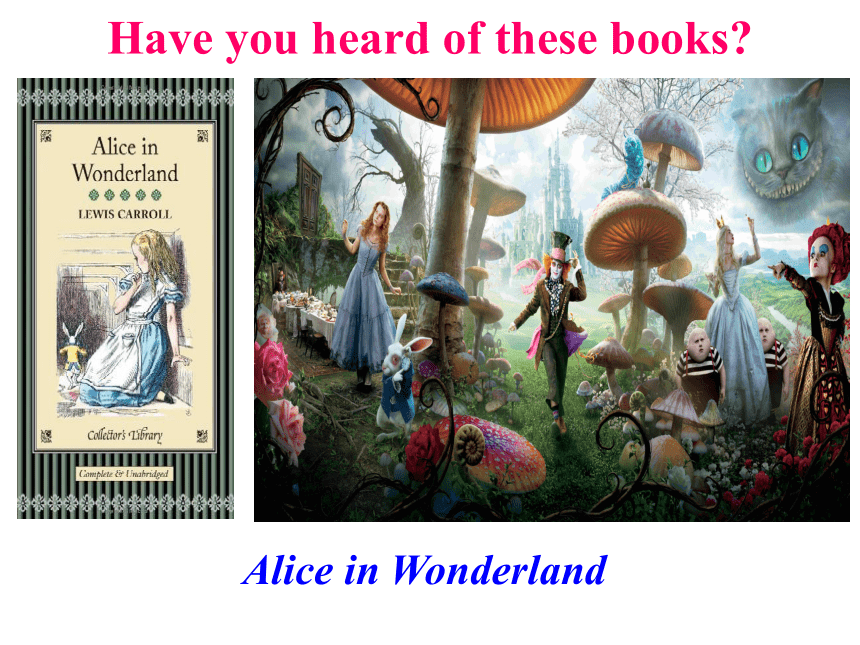
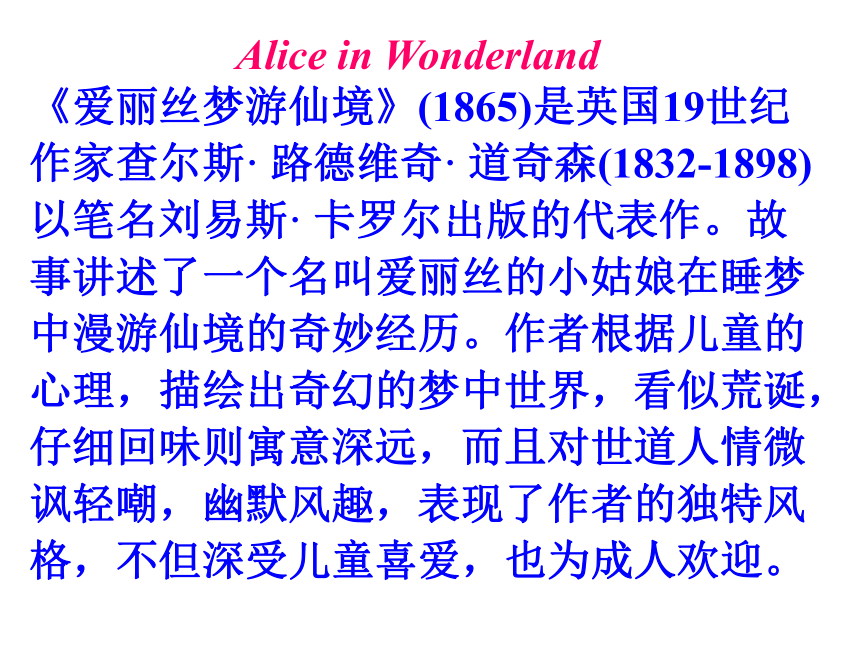
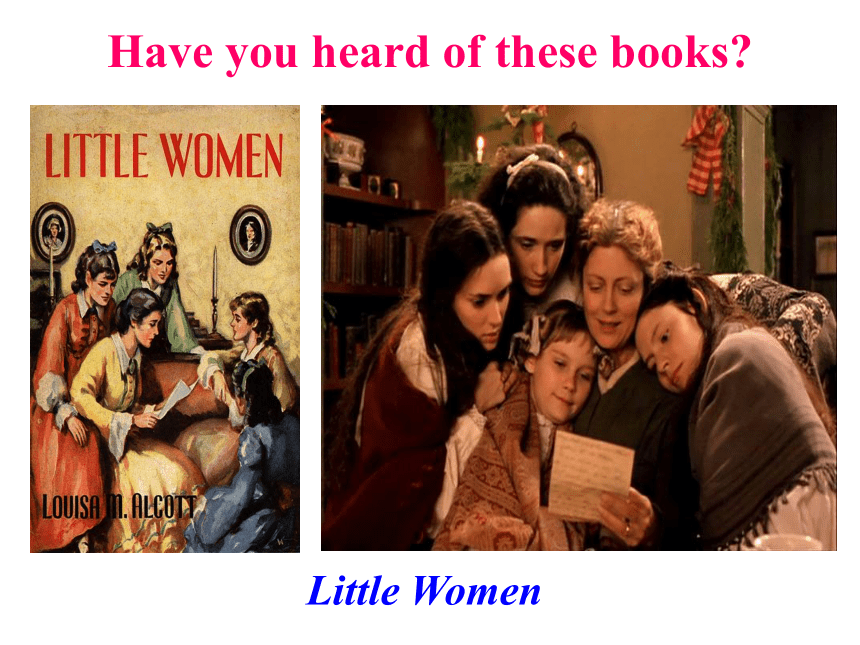
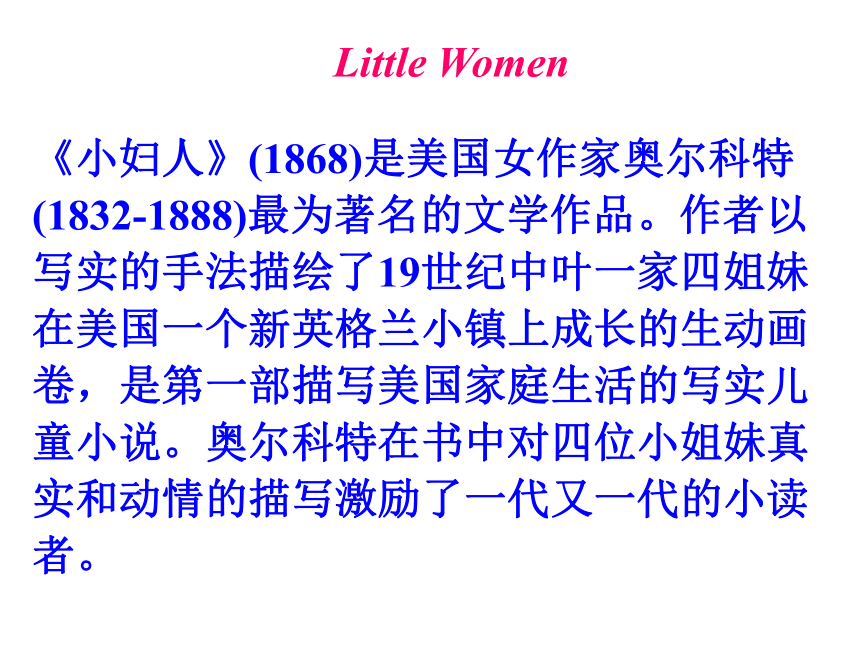
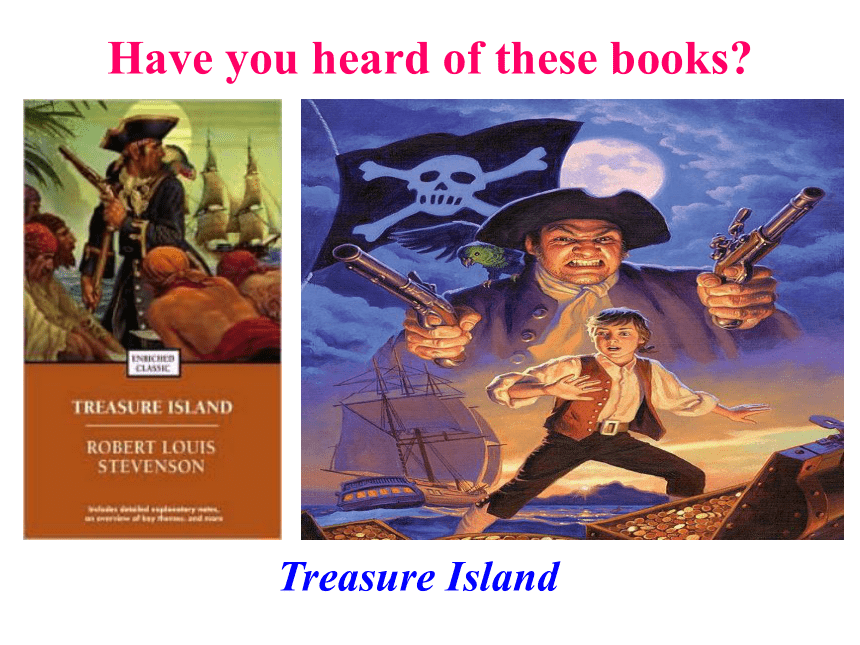
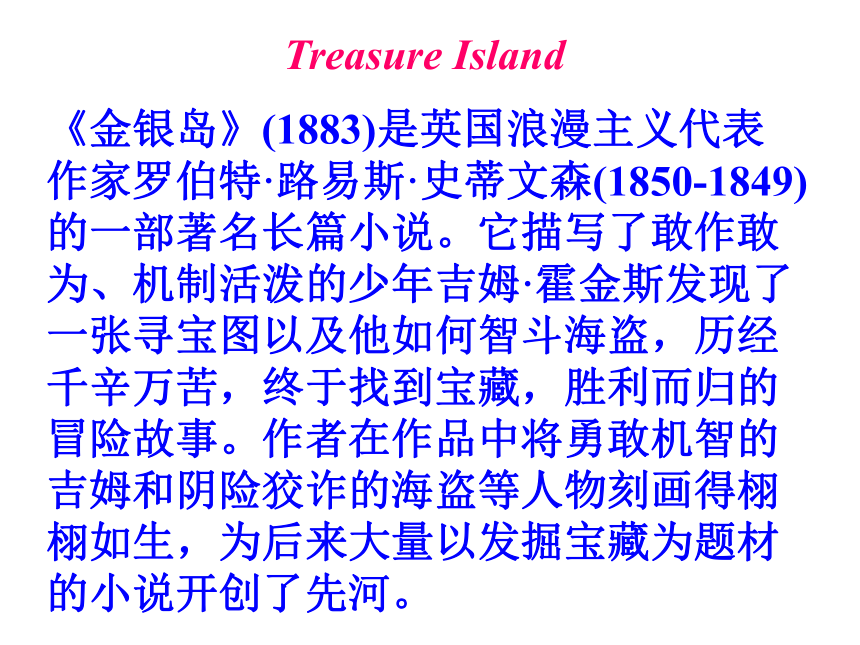
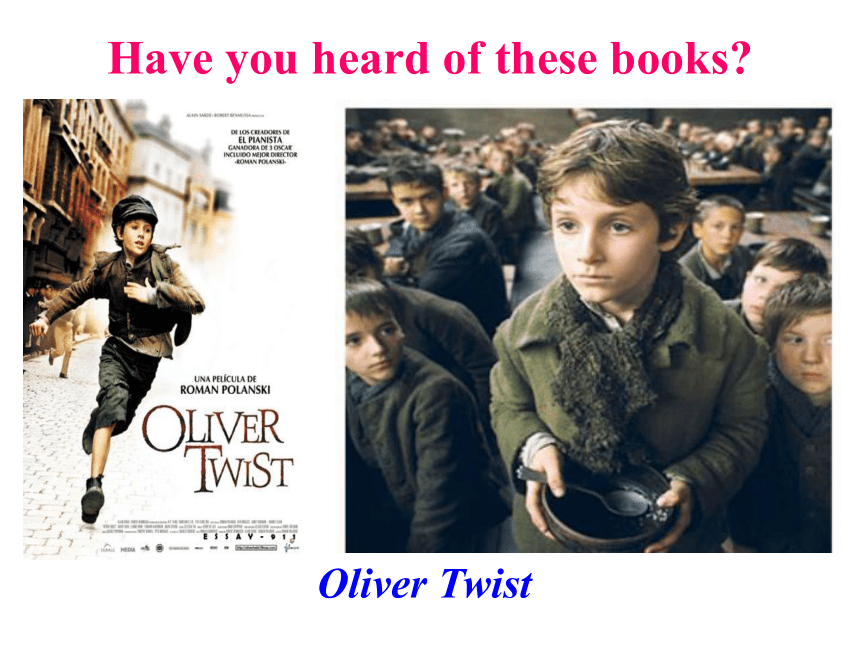
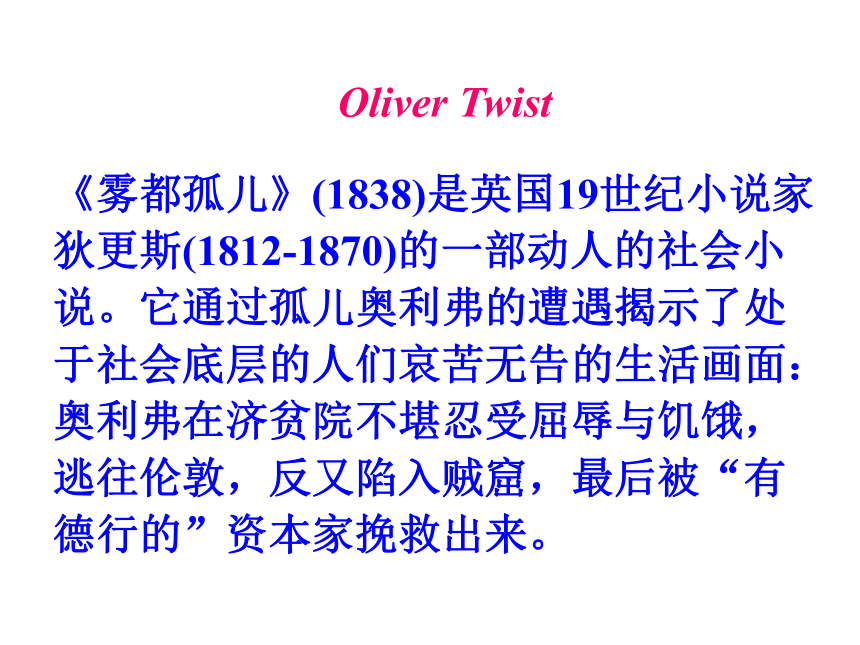
文档简介
(共27张PPT)
Unit 8
Have you read Treasure Island yet
Section A
1a-2d
Have you heard of these books
Alice in Wonderland
《爱丽丝梦游仙境》(1865)是英国19世纪作家查尔斯· 路德维奇· 道奇森(1832-1898)以笔名刘易斯· 卡罗尔出版的代表作。故事讲述了一个名叫爱丽丝的小姑娘在睡梦中漫游仙境的奇妙经历。作者根据儿童的心理,描绘出奇幻的梦中世界,看似荒诞,仔细回味则寓意深远,而且对世道人情微讽轻嘲,幽默风趣,表现了作者的独特风格,不但深受儿童喜爱,也为成人欢迎。
Alice in Wonderland
Little Women
Have you heard of these books
《小妇人》(1868)是美国女作家奥尔科特
(1832-1888)最为著名的文学作品。作者以
写实的手法描绘了19世纪中叶一家四姐妹
在美国一个新英格兰小镇上成长的生动画
卷,是第一部描写美国家庭生活的写实儿
童小说。奥尔科特在书中对四位小姐妹真
实和动情的描写激励了一代又一代的小读
者。
Little Women
Treasure Island
Have you heard of these books
《金银岛》(1883)是英国浪漫主义代表作家罗伯特·路易斯·史蒂文森(1850-1849)的一部著名长篇小说。它描写了敢作敢为、机制活泼的少年吉姆·霍金斯发现了一张寻宝图以及他如何智斗海盗,历经千辛万苦,终于找到宝藏,胜利而归的冒险故事。作者在作品中将勇敢机智的吉姆和阴险狡诈的海盗等人物刻画得栩栩如生,为后来大量以发掘宝藏为题材的小说开创了先河。
Treasure Island
Oliver Twist
Have you heard of these books
《雾都孤儿》(1838)是英国19世纪小说家狄更斯(1812-1870)的一部动人的社会小说。它通过孤儿奥利弗的遭遇揭示了处于社会底层的人们哀苦无告的生活画面:奥利弗在济贫院不堪忍受屈辱与饥饿,逃往伦敦,反又陷入贼窟,最后被“有德行的”资本家挽救出来。
Oliver Twist
Robinson Crusoe
Have you heard of these books
《鲁宾逊漂流记》(1719)是英国作家丹尼尔·笛福(1660-1730)的代表作,故事取材于英格兰水手塞尔科克被弃荒岛数年的经历,描写了主人公鲁滨逊在荒岛上生活28年的经历,歌颂了劳动,礼赞了人对自然的斗争。
Robinson Crusoe
Tom Sawyer
Have you heard of these books
《汤姆·索亚历险记》(1876)是19世纪美国杰出的幽默讽刺作家马克·吐温(1835-1910)具有代表性的长篇小说作品。这是一部以密西西比河上某小镇为背景的少年读物,但为任何年龄的读者所喜爱。故事描写淘气的汤姆和他的伙伴哈克贝里·费恩以及汤姆喜欢的女孩贝姬·撒切尔的许多故事,有许多合乎孩子心理的有趣情节。课本上为学生学习方便,把书名简写为Tom Sawyer。
The Adventure of Tom Sawyer
treasure n.
island n.
classic n.
page n.
hurry v./n.
hurry up
due adj.
珠宝;财富
岛
经典作品;名著
(书刊或纸张的)页,面,张
匆忙;赶快
赶快;急忙(做某事)
预期;预定
New Words
1a
Have you heard of these books Check (√) the ones you know.
____ Alice in Wonderland
____ Little Women
____ Treasure Island
____ Oliver Twist
____ Robinson Crusoe
____ Tom Sawyer
[′w nd l nd]
[′ liv]
[twist]
[′kru:s u]
[′s :j ]
1c
Practice the conversation. Then talk about the other books in 1a.
A: Have you read little women yet
B: No, I haven’t. Have you
A: Yes, I’ve already read it.
B: What’s it like
A: It’s fantastic.
have + done (动词过去分词)
-Where are you going for your holiday
-Well, we haven’t decided ______.
A. already B. yet
C. either D. too
【点拨】选B。答语意为“我们还没有决定(去哪里)”。yet“已经;然而”,常与完成时连用,且常用于否定句或疑问句,置于句末。故选B。
2c
Use the information in 2a and 2b to talk about the books.
A: Has Tina read Treasure Island
B: Yes, she has.
She thinks it’s fantastic.
A: What’s it about
B: It’s about…
has + done (动词过去分词)
1. Which books have Amy and Steve chosen to
write about
2. Has Steve finished reading his book yet
What's the book about
What does he think of the book
3. Has Amy finished reading her book yet
How many pages has she already read
What's it like
4.When do they have to hand in the book report
Read 2d to answer the questions.
2d
Treasure Island
Little Women
Yes, he has.
It’s about four sisters growing up.
Really good.
Yes, she hasn’t.
25
It looks interesting.
In two weeks.
听说
关于
出去
充满
完成做某事
长大,成长
放下;记下
至少
书的背面
赶快;快点
两星期后
hear of
be about
go out
full of
finish doing
grow up
put down
at least
the back of the book
hurry up
in two weeks
1. Have you heard of these books
2. Have you ever read Little Women yet
No, I haven't. I've already read it.
3. What’s it like What’s it about
4. Oliver Twist is about a boy who goes out to
sea and finds an island full of treasures.
5. Robinson Crusoe is a classic.
6. Steve, have you decided yet which book to
write about for English class
7. It's about four sisters growing up.
8. I'm only on page 25.
9. Have you at least read the back of the book
to see what it's about
10. You should hurry up.
11. The book report is due in two weeks.
根据所给汉语填空。
1.I hear some of us like reading _______ (名著).
2. How many _____ (页) have you read
3. It’s already 7 o’clock. Let’s ________ (赶快).
4. The book report is ____ (到期) in five days.
5. There are some big _______ (岛) in our
country.
6. My father has a box full of ________ (珠宝).
classics
pages
hurry up
due
islands
treasures
Explanation
yet常用于现在完成时的一般疑问句或
否定句的句末。
用于疑问句时,意为“已经”;
用于否定句时,意为“还”。
not yet常用在答语中,意为“尚未;还没有”
already 般用于肯定句,常放于句中,
实义动词之前,助动词之后。
用于疑问句时表示惊讶,出乎意料。
1.…and finds a island full of treasure.
full of treasures作定语修饰island
他有一个满是书的箱子。
He has a box full of books.
full adj.满的
be full of… 充满… (状态)
教室里满是学生。
The classroom is full of students.
fill v.装满
fill…with…用…把…装满
他把杯子里装满水。
He filled the glass with water.
be filled with… 充满… (动作)
杯子里充满了水。
The glass is filled with water.
2. The book report is due in two weeks.
due adj.
①预期的; 预定的
be due to do sth./for sth.
He is due to come.
You are due for an exam tomorrow.
②到期的; 应付的
be due to sb 应付给某人
The money is due to you.
③due to 因为; 由于 + n./pron/doing=
He didn’t come to school due to his illness.
because of
Unit 8
Have you read Treasure Island yet
Section A
1a-2d
Have you heard of these books
Alice in Wonderland
《爱丽丝梦游仙境》(1865)是英国19世纪作家查尔斯· 路德维奇· 道奇森(1832-1898)以笔名刘易斯· 卡罗尔出版的代表作。故事讲述了一个名叫爱丽丝的小姑娘在睡梦中漫游仙境的奇妙经历。作者根据儿童的心理,描绘出奇幻的梦中世界,看似荒诞,仔细回味则寓意深远,而且对世道人情微讽轻嘲,幽默风趣,表现了作者的独特风格,不但深受儿童喜爱,也为成人欢迎。
Alice in Wonderland
Little Women
Have you heard of these books
《小妇人》(1868)是美国女作家奥尔科特
(1832-1888)最为著名的文学作品。作者以
写实的手法描绘了19世纪中叶一家四姐妹
在美国一个新英格兰小镇上成长的生动画
卷,是第一部描写美国家庭生活的写实儿
童小说。奥尔科特在书中对四位小姐妹真
实和动情的描写激励了一代又一代的小读
者。
Little Women
Treasure Island
Have you heard of these books
《金银岛》(1883)是英国浪漫主义代表作家罗伯特·路易斯·史蒂文森(1850-1849)的一部著名长篇小说。它描写了敢作敢为、机制活泼的少年吉姆·霍金斯发现了一张寻宝图以及他如何智斗海盗,历经千辛万苦,终于找到宝藏,胜利而归的冒险故事。作者在作品中将勇敢机智的吉姆和阴险狡诈的海盗等人物刻画得栩栩如生,为后来大量以发掘宝藏为题材的小说开创了先河。
Treasure Island
Oliver Twist
Have you heard of these books
《雾都孤儿》(1838)是英国19世纪小说家狄更斯(1812-1870)的一部动人的社会小说。它通过孤儿奥利弗的遭遇揭示了处于社会底层的人们哀苦无告的生活画面:奥利弗在济贫院不堪忍受屈辱与饥饿,逃往伦敦,反又陷入贼窟,最后被“有德行的”资本家挽救出来。
Oliver Twist
Robinson Crusoe
Have you heard of these books
《鲁宾逊漂流记》(1719)是英国作家丹尼尔·笛福(1660-1730)的代表作,故事取材于英格兰水手塞尔科克被弃荒岛数年的经历,描写了主人公鲁滨逊在荒岛上生活28年的经历,歌颂了劳动,礼赞了人对自然的斗争。
Robinson Crusoe
Tom Sawyer
Have you heard of these books
《汤姆·索亚历险记》(1876)是19世纪美国杰出的幽默讽刺作家马克·吐温(1835-1910)具有代表性的长篇小说作品。这是一部以密西西比河上某小镇为背景的少年读物,但为任何年龄的读者所喜爱。故事描写淘气的汤姆和他的伙伴哈克贝里·费恩以及汤姆喜欢的女孩贝姬·撒切尔的许多故事,有许多合乎孩子心理的有趣情节。课本上为学生学习方便,把书名简写为Tom Sawyer。
The Adventure of Tom Sawyer
treasure n.
island n.
classic n.
page n.
hurry v./n.
hurry up
due adj.
珠宝;财富
岛
经典作品;名著
(书刊或纸张的)页,面,张
匆忙;赶快
赶快;急忙(做某事)
预期;预定
New Words
1a
Have you heard of these books Check (√) the ones you know.
____ Alice in Wonderland
____ Little Women
____ Treasure Island
____ Oliver Twist
____ Robinson Crusoe
____ Tom Sawyer
[′w nd l nd]
[′ liv]
[twist]
[′kru:s u]
[′s :j ]
1c
Practice the conversation. Then talk about the other books in 1a.
A: Have you read little women yet
B: No, I haven’t. Have you
A: Yes, I’ve already read it.
B: What’s it like
A: It’s fantastic.
have + done (动词过去分词)
-Where are you going for your holiday
-Well, we haven’t decided ______.
A. already B. yet
C. either D. too
【点拨】选B。答语意为“我们还没有决定(去哪里)”。yet“已经;然而”,常与完成时连用,且常用于否定句或疑问句,置于句末。故选B。
2c
Use the information in 2a and 2b to talk about the books.
A: Has Tina read Treasure Island
B: Yes, she has.
She thinks it’s fantastic.
A: What’s it about
B: It’s about…
has + done (动词过去分词)
1. Which books have Amy and Steve chosen to
write about
2. Has Steve finished reading his book yet
What's the book about
What does he think of the book
3. Has Amy finished reading her book yet
How many pages has she already read
What's it like
4.When do they have to hand in the book report
Read 2d to answer the questions.
2d
Treasure Island
Little Women
Yes, he has.
It’s about four sisters growing up.
Really good.
Yes, she hasn’t.
25
It looks interesting.
In two weeks.
听说
关于
出去
充满
完成做某事
长大,成长
放下;记下
至少
书的背面
赶快;快点
两星期后
hear of
be about
go out
full of
finish doing
grow up
put down
at least
the back of the book
hurry up
in two weeks
1. Have you heard of these books
2. Have you ever read Little Women yet
No, I haven't. I've already read it.
3. What’s it like What’s it about
4. Oliver Twist is about a boy who goes out to
sea and finds an island full of treasures.
5. Robinson Crusoe is a classic.
6. Steve, have you decided yet which book to
write about for English class
7. It's about four sisters growing up.
8. I'm only on page 25.
9. Have you at least read the back of the book
to see what it's about
10. You should hurry up.
11. The book report is due in two weeks.
根据所给汉语填空。
1.I hear some of us like reading _______ (名著).
2. How many _____ (页) have you read
3. It’s already 7 o’clock. Let’s ________ (赶快).
4. The book report is ____ (到期) in five days.
5. There are some big _______ (岛) in our
country.
6. My father has a box full of ________ (珠宝).
classics
pages
hurry up
due
islands
treasures
Explanation
yet常用于现在完成时的一般疑问句或
否定句的句末。
用于疑问句时,意为“已经”;
用于否定句时,意为“还”。
not yet常用在答语中,意为“尚未;还没有”
already 般用于肯定句,常放于句中,
实义动词之前,助动词之后。
用于疑问句时表示惊讶,出乎意料。
1.…and finds a island full of treasure.
full of treasures作定语修饰island
他有一个满是书的箱子。
He has a box full of books.
full adj.满的
be full of… 充满… (状态)
教室里满是学生。
The classroom is full of students.
fill v.装满
fill…with…用…把…装满
他把杯子里装满水。
He filled the glass with water.
be filled with… 充满… (动作)
杯子里充满了水。
The glass is filled with water.
2. The book report is due in two weeks.
due adj.
①预期的; 预定的
be due to do sth./for sth.
He is due to come.
You are due for an exam tomorrow.
②到期的; 应付的
be due to sb 应付给某人
The money is due to you.
③due to 因为; 由于 + n./pron/doing=
He didn’t come to school due to his illness.
because of
同课章节目录
- Unit 1 What's the matter?
- Section A
- Section B
- Unit 2 I'll help to clean up the city parks.
- Section A
- Section B
- Unit 3 Could you please clean your room?
- Section A
- Section B
- Unit 4 Why don't you talk to your parents?
- Section A
- Section B
- Unit 5 What were you doing when the rainstorm came
- Section A
- Section B
- Review of Units 1-5
- Unit 6 An old man tried to move the mountains.
- Section A
- Section B
- Unit 7 What's the highest mountain in the world?
- Section A
- Section B
- Unit 8 Have you read Treasure Island yet?
- Section A
- Section B
- Unit 9 Have you ever been to a museum?
- Section A
- Section B
- Unit 10 I've had this bike for three years.
- Section A
- Section B
